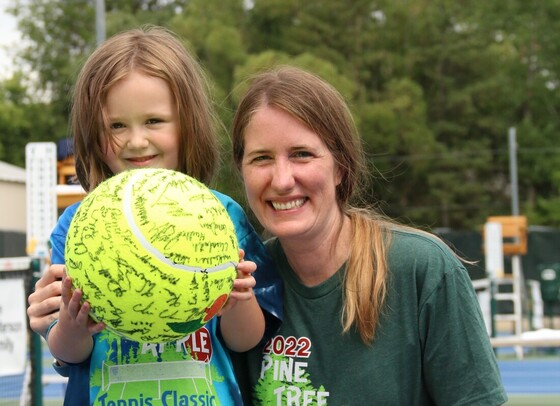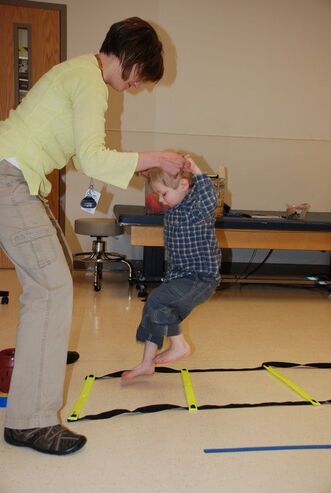Supported Research Programs
Funds raised by the Pine Tree Apple Tennis Classic (PTATC) are used primarily to support research areas where there is little or no national attention and can be broken out into two main categories: DICER1 Rare Tumor Research and Preventing Cancer Treatment Side Effects.
DICER1 Rare Tumor Research

While advancements are being made for the most common childhood cancers, the same is not true for rare tumors. Pleuropulmonary Blastoma (PPB) is a rare but aggressive lung tumor that occurs in very young children, usually children under age 7.
In 1987, PTATC began supporting the International PPB Registry. In 2011, PTATC funding helped launch the opening of the International Ovarian and Testicular Stromal Tumor (OTST) Registry to study additional rare childhood tumors. Thanks to research funded by Pine Tree, the genetic link between these tumors and other cancers including kidney, thyroid and brain tumors has been found. This gene, called DICER1, is a critical regulator of cell growth. Thanks to this finding, we have expanded this research to include all DICER1 related tumors and have a new name, the International PPB/DICER1 Registry to reflect this expanding work. Under the leadership of Dr. Kris Ann Schultz, the Registries seek to define optimal care for children with these rare diseases and develop more effective and less toxic therapies for children and adults throughout the world.
Combined, the Registries have enrolled more than 1,000 individuals from more than 49 countries and are now considered the model for other rare tumor registries.
This work has the potential to impact many, many people – including those without PPB or ovarian tumors – and may help oncologists around the world understand how to treat a wide variety of other tumors. Thanks to this research, new surveillance guidelines have been developed and are now in widespread use, allowing the diagnosis of many of these tumors in their earliest and most curable form. Our work continues to ensure early diagnosis whenever possible and to ensure that novel therapies are developed for those children and adults who still face the most aggressive types of these tumors.
In 1987, PTATC began supporting the International PPB Registry. In 2011, PTATC funding helped launch the opening of the International Ovarian and Testicular Stromal Tumor (OTST) Registry to study additional rare childhood tumors. Thanks to research funded by Pine Tree, the genetic link between these tumors and other cancers including kidney, thyroid and brain tumors has been found. This gene, called DICER1, is a critical regulator of cell growth. Thanks to this finding, we have expanded this research to include all DICER1 related tumors and have a new name, the International PPB/DICER1 Registry to reflect this expanding work. Under the leadership of Dr. Kris Ann Schultz, the Registries seek to define optimal care for children with these rare diseases and develop more effective and less toxic therapies for children and adults throughout the world.
Combined, the Registries have enrolled more than 1,000 individuals from more than 49 countries and are now considered the model for other rare tumor registries.
This work has the potential to impact many, many people – including those without PPB or ovarian tumors – and may help oncologists around the world understand how to treat a wide variety of other tumors. Thanks to this research, new surveillance guidelines have been developed and are now in widespread use, allowing the diagnosis of many of these tumors in their earliest and most curable form. Our work continues to ensure early diagnosis whenever possible and to ensure that novel therapies are developed for those children and adults who still face the most aggressive types of these tumors.
Preventing Cancer Treatment Side Effects

Going through cancer treatment is difficult at any age. But because kids’ bodies are rapidly growing and developing while they undergo treatments such as chemotherapy and radiation, they are more susceptible to long-term side effects that can hinder physical, cognitive and emotional development. These impairments begin early in treatment and can cause physical limitations into adulthood.
Many children with the most common childhood cancers are surviving their diseases. In 1960, only 10% of children survived acute lymphoblastic leukemia (ALL), the most common type of childhood cancer. Today, over 90% of children diagnosed with ALL are cured.
With survival rates rising, emphasis in pediatric oncology research is being placed not only on the cure but also on improving the long-term function of pediatric cancer survivors. Lynn Tanner, PT and Dr. Laura Gilchrist - through Pine Tree’s support - have focused on this cause since 2004. Tanner, Dr. Gilchrist and the team at Children’s Minnesota collaborate with staff at other hospitals to do research designed to improve physical functional outcomes. They investigate issues that may arise due to treatment—such as muscle weakness, balance impairment, ankle contractures and neuropathy — a weakness, numbness and/or pain in hands and feet caused by nerve damage, estimated to occur in 80-90% of pediatric patients with cancer.
One focus is determining which changes persist long-term and which are preventable. Many families accepted such deficits as “normal” during cancer treatment. However, the cancer rehabilitation research team has uncovered a number of interventions, including embedding physical therapy activity into patients’ treatment plans, to bring fun, engaging activities that help patients lead an active lifestyle with their peers.
This unique physical therapy program began at Children’s Minnesota thanks to Pine Tree Apple Classic Fund, and has now been implemented at many children’s hospitals around the world.
Many children with the most common childhood cancers are surviving their diseases. In 1960, only 10% of children survived acute lymphoblastic leukemia (ALL), the most common type of childhood cancer. Today, over 90% of children diagnosed with ALL are cured.
With survival rates rising, emphasis in pediatric oncology research is being placed not only on the cure but also on improving the long-term function of pediatric cancer survivors. Lynn Tanner, PT and Dr. Laura Gilchrist - through Pine Tree’s support - have focused on this cause since 2004. Tanner, Dr. Gilchrist and the team at Children’s Minnesota collaborate with staff at other hospitals to do research designed to improve physical functional outcomes. They investigate issues that may arise due to treatment—such as muscle weakness, balance impairment, ankle contractures and neuropathy — a weakness, numbness and/or pain in hands and feet caused by nerve damage, estimated to occur in 80-90% of pediatric patients with cancer.
One focus is determining which changes persist long-term and which are preventable. Many families accepted such deficits as “normal” during cancer treatment. However, the cancer rehabilitation research team has uncovered a number of interventions, including embedding physical therapy activity into patients’ treatment plans, to bring fun, engaging activities that help patients lead an active lifestyle with their peers.
This unique physical therapy program began at Children’s Minnesota thanks to Pine Tree Apple Classic Fund, and has now been implemented at many children’s hospitals around the world.
News & Resource Links
- Pleuropulmonary Blastoma Registry
- Ovarian and Testicular Stromal Tumor Registry
- Today Health - One rare cancer leads to another: Cancer registry saves baby’s life
- New NIH Research Funding awarded to Dr. Kris Ann Schultz and her Global Team of Researchers
- KARE 11 - How Virtual Physical Therapy is Helping Patients During COVID-19
- 2020 Academy of Oncologic Physical Therapy, APTA. - Rehabilitation Oncology: A Race To Access and Outcomes by Lynn R. Tanner, PT, MPT
- Assessment of Pediatric Chemotherapy-Induced Peripheral Neuropathy Using a New Patient-Reported Outcome Measure: The P-CIN by Ellen M. Lavoie Smith, PhD MSN RN AOCN® FAAN1, Clare Kuisell, BSN RN PhD1, Grace Kanzawa-Lee, PhD BSN RN1, Celia M. Bridges, BA BSN RN1, Youmin Cho, MSN RN AGPCNP-BC1, Jenna Swets, BSN RN2, Jamie L. Renbarger, MD MS3, and Laura S. Gilchrist, PhD PT4
Funds raised benefit
|
Kris Ann Schultz, MD Pine Tree Apple Classic Endowed Chair in Cancer and Blood Disorders [email protected] |
|
|
|
|
|

